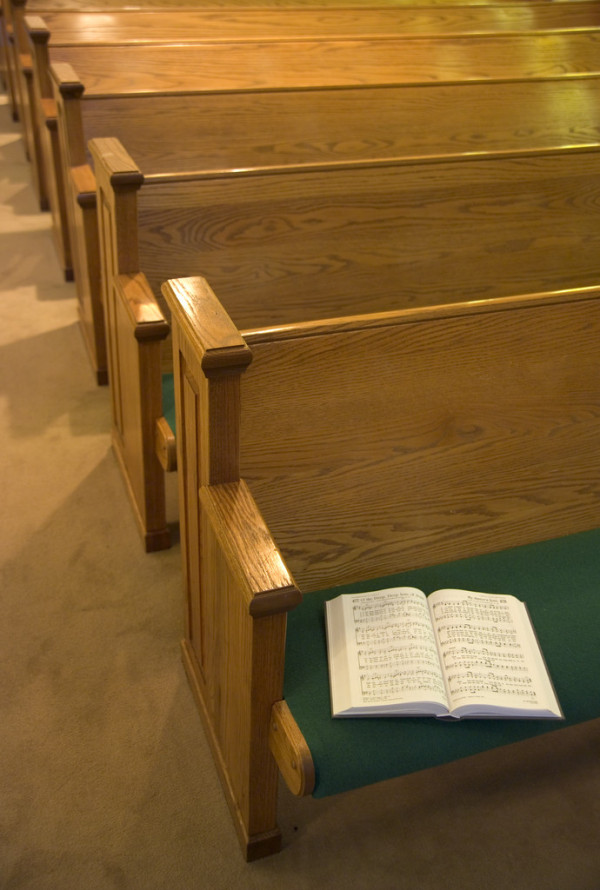Forming the Life of the Congregation Through Music
Musical Practices of Christian Inclusion
A. People can only sing melodies that are within their abilities and that have been truly learned. In retrospect, this seems obvious: how does one sing what one does not know and cannot do? Leaders must consider the matter of teaching their people with greater attention and intention. Some may find it possible to project not only words but also music notation of the melody on the screen. Even though most people will not immediately be able to read music, everyone can understand that the dots go up and down with the melody. Prolonged exposure to music notation will result in a basic reading ability: many who grew up in hymnbook-using churches acquired musical literacy simply by showing up and trying once a week. The ability to read music is not only an aid to corporate worship, but is a beautiful gift that worship leaders can quietly and slowly give their people.
Songs that invite Christians to give priority yet again to their private emotional experience are pervasive, easy to produce, and superficially attractive.
Finally (and this is really an area reserved for musicians), melodies with extended vocal ranges, awkward leaps, and difficult syncopations should be revised to place them within the people’s abilities.
B. Sometimes the fellow behind the mixing board is not musically sensitive. Most churches rely on volunteers, a case in which the most important ability is availability. Still, guidance from a musician would probably improve the situation. The needed musical wisdom includes knowing the difference between a melody and an accompaniment, good sense about instrumental balance, and a determination that no matter how good the band is, the sound of the people is more beautiful still. The level of the sound system subtly shapes the congregation’s sense of their own necessity, their thoughts about their own role in the ministry. Setting the volume control is an act of ecclesiology.
 C. Worship leaders must pursue music that is truth-telling. By this I mean songs which tell the truth about how life actually is, honoring that reality and helping us to carry on with it. God is close, but in this present age he is also distant. We do not yet live in the time when the dwelling of God is with men and he wipes away their tears. Many songs are written with the assumption that such an eschatological closeness is available, and should be the status quo, today. Even those songs that speak of a hunger or a desperation for God often include a claim that it has been satisfied. Perhaps we are even invited to imagine that the hunger is fed and the desperation answered during and by means of the song: it serves as a dramatically-enacted spiritual encounter.
C. Worship leaders must pursue music that is truth-telling. By this I mean songs which tell the truth about how life actually is, honoring that reality and helping us to carry on with it. God is close, but in this present age he is also distant. We do not yet live in the time when the dwelling of God is with men and he wipes away their tears. Many songs are written with the assumption that such an eschatological closeness is available, and should be the status quo, today. Even those songs that speak of a hunger or a desperation for God often include a claim that it has been satisfied. Perhaps we are even invited to imagine that the hunger is fed and the desperation answered during and by means of the song: it serves as a dramatically-enacted spiritual encounter.
Again, songs of aspiration are appropriate for the church. It is good to sing of closeness with God. It is not good to fail to learn to live with his distance. In selecting and writing songs, worship leaders have an opportunity and an obligation to serve as chief emotional officers for their people, teaching them (as the Psalms do) how rightly to enjoy God’s presence and faithfully wait out his absence.
Frankly, I do not think that narcissism and consumerism are the only reasons we have so much spiritual navel-gazing in our songs. The fact is that texts about vague personal feelings, without any specific references to concrete events, are easy to write. (Especially if they don’t have to rhyme.) It is difficult indeed to compose lyrics that, say, lament socio-economic injustice in a particular neighborhood, call on God to act, and urge the church to do something. It is much easier to come up with the following:
As I stand in your presence
I can feel your mercies flow
As I bathe in your essence
I can feel my spirit grow
I just wrote that right now, in about fifteen seconds. It was easy because it is bad. It is bad because it says nothing, yet reinforces within us all that is self-absorbed and adolescent.


